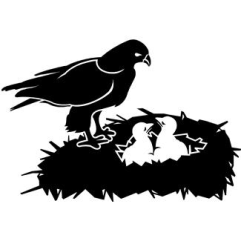Project for Research Experiences for Undergraduates
2011 Summer Program, May 31 - July 22, 2011
National Institute for Mathematical and Biological Synthesis (NIMBioS)
at the University of Tennessee, Knoxville
Title: How does the effort a mother bird expends on her offspring depend on the attractiveness of her mate?
Mentors: Dr. Tony Jhwueng (Mathematics/Statistics) and Dr. Tucker Gilman (Biology)
 A large body of theory suggests that mothers should invest more energy in their offspring when those offspring carry high-value genes from attractive mates. Researchers have tested this theory in the field by asking whether female birds produce eggs with higher androgen content when those females have been exposed to more attractive males, but support for the theory has so far been mixed. In an unpublished paper, Goglio and Christian argued that studies in polygamous bird species tend to support the theoretical results, while studies in monogamous bird species do not. This project aims to complete and extend the unpublished work in order to expand both the theoretical and empirical understanding of maternal investment in offspring. The approach will be to conduct a thorough meta-analysis of the avian literature, with statistical analyses corrected to account for phylogenetic relatedness among bird species. We will go through the entire research process from planning the study to writing up the results, and hope to submit a paper for peer review at the end of the eight-week session.
A large body of theory suggests that mothers should invest more energy in their offspring when those offspring carry high-value genes from attractive mates. Researchers have tested this theory in the field by asking whether female birds produce eggs with higher androgen content when those females have been exposed to more attractive males, but support for the theory has so far been mixed. In an unpublished paper, Goglio and Christian argued that studies in polygamous bird species tend to support the theoretical results, while studies in monogamous bird species do not. This project aims to complete and extend the unpublished work in order to expand both the theoretical and empirical understanding of maternal investment in offspring. The approach will be to conduct a thorough meta-analysis of the avian literature, with statistical analyses corrected to account for phylogenetic relatedness among bird species. We will go through the entire research process from planning the study to writing up the results, and hope to submit a paper for peer review at the end of the eight-week session.
Abstract of project report (PDF)
Return to REU/REV 2011.
NIMBioS
1122 Volunteer Blvd., Suite 106
University of Tennessee
Knoxville,
TN 37996-3410
PH: (865) 974-9334
FAX: (865) 974-9461
Contact NIMBioS


